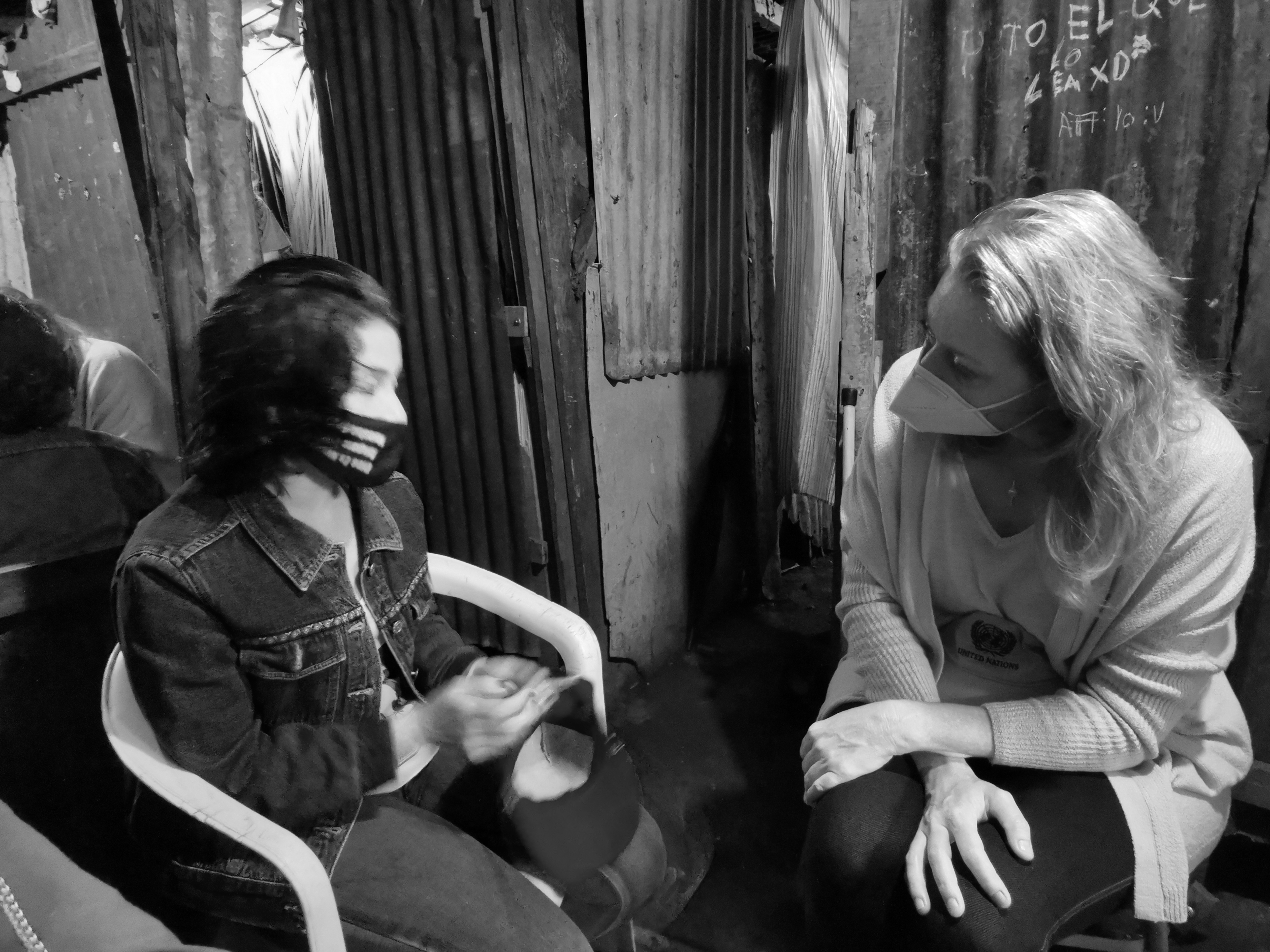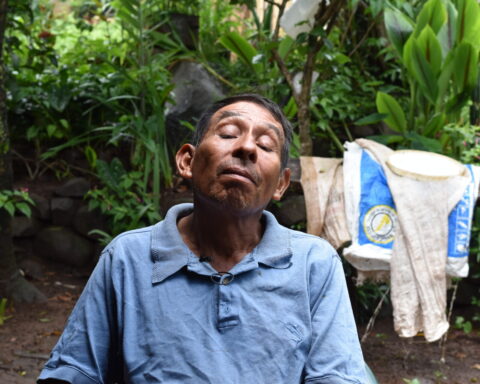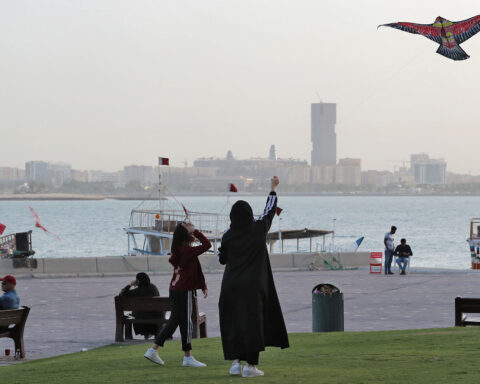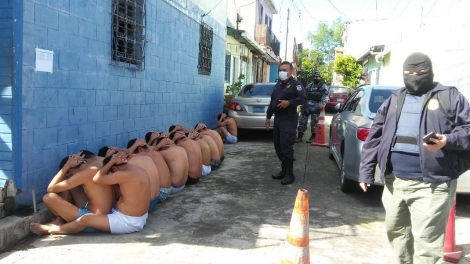Lilith, not her real name, who now has a three-year-old son, was able to flee to neighbouring Costa Rica, where she has dedicated her life to protecting and preventing violence and abuse against young women and girls.

Lilith says she was traded as collateral in a card game. UN Costa Rica/Danilo Mora
She has since taken on a leadership role in the development of a UN-supported campaign “Ponete en Mis Zapatos”, or “Put Yourself in My Shoes”, which brings together asylum-seekers and refugees, many of whom like Lilith have experienced violence, to fight xenophobia and other forms of discrimination in their host communities.
Read more about Lilith’s
Walking in Lilith’s shoes
“My great dream is to be a journalist, so I can tell all girls and young women that they are not alone, that we can support each other and fight together against violence, abuse and discrimination.”
She came from Nicaragua and applied for refugee status. Now she is intent on building a better present and future in Costa Rica for herself, but also for other young women, girls and teenagers.
Lilith* has a spark in her eyes, and the multiple troubles she has endured have not extinguished it. She learned to read and write when she was three years old, and she is determined about what she wants in life.
Every time words come out of her mouth, her hands move to emphasize the ideas and her eyes seek the gaze of the people she is speaking with. An excellent storyteller, she easily captures her audience’s attention.
That’s why it is impossible not to empathize with this young woman who, at 19 years old, is the mother of a three-year-old and has the personal background of a centenarian.
The team from the United Nations in Costa Rica, led by Resident Coordinator Allegra Baiocchi, visited Lilith where she lives, in a neighbourhood of San José, Costa Rica that is populated by many of those pushed to the margins of society.
Technically, this is not her house, but it already feels like home to her.
Mayela — her “new mother” whom she met online through support groups for refugees and migrants — invited her to move in with her and her family. Since then, Lilith has not felt alone and, for the first time, feels that “she has a family.”
We sat down with Lilith in a small room of the house, which is made of corrugated metal sheets from old barrels, and lacks a floor and basic services, but which is full of people who love and support each other unconditionally. The home is also full of pets: there are at least five cats and a dog that constantly approaches Lilith, seeking her care and loving attention.
Right from the start of the interview, Lilith’s charming and expressive personality emerged.
Her eyes brimmed with tears as she told us about her difficult past, but filled with an inspiring hope as she described how dearly she wanted to study, become a journalist and devote her life to protecting and preventing violence and abuse against young women and girls.
Lilith faced a life of abandonment, exclusion and abuse as a child. She recounts how she was exchanged as “tradable currency” in a card game when she was still a child, and that she was a survivor of child trafficking and exploitation. These events have marked her life, but they did not tarnish the hopes and wishes of this young fighter.
Her involvement in social protests for justice and access to education — as well as the complaint she filed for abuse — led to death threats against her and her son, forcing her to flee her native country.
She told us that she admires [the activist Malala Yousafzai] because from a very young age she has fought for her ideals and promoted education, and her example demonstrates that young women and girls can change the world.
With overwhelming confidence, Lilith says that she has three goals in Costa Rica. To be part of a family — which she has already achieved thanks to her new mom, Mayela. To study — which she plans to do against next year. And her third great desire is to become a well-known journalist to help protect young women and girls from violence.
Lilith explained that she can easily relate to other people and inspire them to take action. To illustrate, she shared an anecdote about speaking in front of a group of young women refugees and asylum-seekers. They were fearful. But through her own example, Lilith inspired others to share their own stories, which were transformed into advice and messages to avoid violence.
This is how Lilith took on a leadership role in the development of the campaign “PONETE EN MIS ZAPATOS,” or “Put yourself in my shoes.” Their motto: “I am a woman, I am a refugee, I have rights.”

This initiative — launched with the support of Defence for Children International (DCI) in Costa Rica, the United Nations in Costa Rica, the United Nations High Commissioner for Refugees (UNHCR/ ACNUR), and the Department of Political Affairs and Peacebuilding (DPPA) — brought together migrant young women and girls, asylum-seekers and refugees to help them become messengers of hope, unity, safety and the fight to end discrimination and violence against women and girls.
The work with the young women showed that, although many of them had experienced violence in their countries of origin, they have also had to endure violence, xenophobia and different forms of discrimination in their host communities, making it even harder to feel included and accepted.
Allegra Baiocchi, UN Resident Coordinator in Costa Rica, was part of the team that visited the household where Lilith lives. Allegra was impressed by Lilith’s enthusiasm and, above all, her commitment to becoming a messenger of hope in the struggle against discrimination and violence.
“It is difficult to imagine the inner strength that Lilith has had to muster to get through this,” says Allegra.
“Her courage and commitment — with her ideals of self-improvement, but also of supporting other young women and girls to prevent violence in their lives — is worthy of recognition and as an inspiration for many other women to join and support each other in their fight to overcome exclusion and violence.”
During her time in Costa Rica, Lilith has received protection and assistance from UNHCR/ ACNUR and two of its partner organizations: Defence for Children International (DCI) and the Centre for Immigrant Social Rights (CENDEROS), through financial and psychosocial support.
Currently, the Instituto Mixto de Ayuda Social (IMAS) — a government agency that provides socioeconomic support, training and care services to mothers so they can work — is studying Lilith’s case to determine what support she will receive.
By the end of 2019, Costa Rica was hosting 6,217 refugees and had more than 87,000 pending requests for asylum. That makes it one of the top-10 countries worldwide in terms of the number of asylum requests, according to the UNHCR report on Global Trends in Forced Displacement.
Most of the refugees and asylum-seekers who arrive in the country are fleeing persecution and violence in Nicaragua, Venezuela, Cuba and northern Central America. However, people from more than 40 nationalities have also been recognized as refugees.
Lilith said goodbye after expressing her gratitude for having been included in this campaign, and she promised to call soon to give further news about her studies, her hopeful future, and her mission to continue empowering more girls and young people in the fight against gender-based violence and discrimination.













